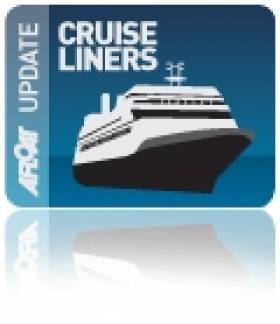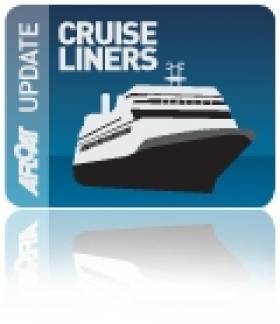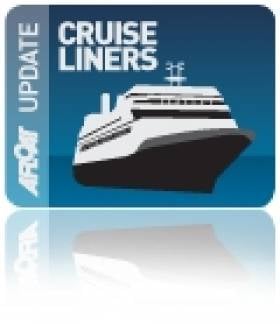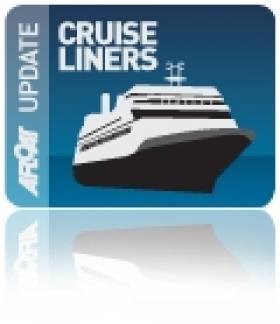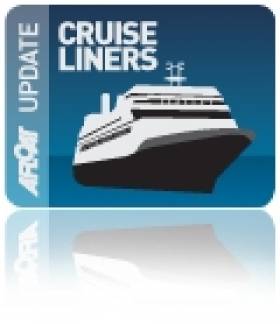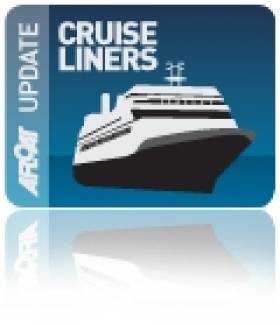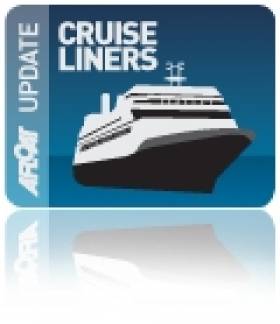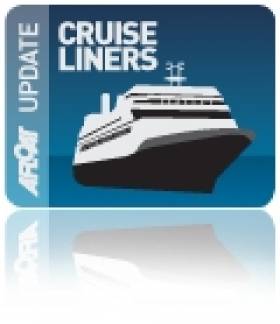Displaying items by tag: Costa Concordia
Earlier this week Italy marked the 10th anniversary of the Costa Concordia shipwreck disaster with commemorations on Isola del Giglio off Tuscany, as RTÉ News reports.
Survivors joined local residents and relatives to remember those lost and give thanks to local residents who gave them shelter on the night of 13 January 2012.
As previously reported on Afloat.ie, one Irish couple were among the more than 4,000 passengers and crew who were evacuated from the vessel after it struck a sandbank near the island. Thirty-two people died in the disaster that ensued.
It was a further two-and-a-half years before the cruise liner was refloated as part of a pioneering international salvage operation.
The ship’s captain, Francesco Schettino, was convicted of multiple counts of manslaughter in connection with the incident. He began his 16-year prison sentence in 2017.
Meanwhile, the ship’s crew were recognised for their “courage and professionalism” in response to the disaster, going above and beyond during what was a hazardous nighttime evacuation.
One of those who survived, Ester Percossi, told a memorial on Thursday: “We come here today to remember, most importantly, those who are no longer with us and to relive the hell that we went through and try in some way to exorcise it.”
RTÉ News has much more on the story HERE.
Costa Concordia Nears Final Stages of Demolition
#CostaConcordia - Work is progressing on the dismantling of the Costa Concordia at a shipyard in Genoa, as a new photo gallery at gCaptain attests.
As many as 200 workers are involved in removing internal fittings and structures from the ill-fated cruise liner, which was refloated in July 2014 in a complex operation some two-and-a-half years after sinking off Tuscany.
An Irish couple were among the more than 4,000 passengers and crew rescued from the vessel on the night of 13 January 2012 in a tragic incident that claimed 32 lives.
Earlier this year the ship's disgraced former captain Francesco Schettino was convicted on multiple counts of manslaughter and sentenced to 16 years after evidence that he abandoned ship during the rescue effort.
The remains of the vessel are now nearing the final stage of demolition with the removal of the first steel sponsons, used to keep the wreck buoyant for the stripping of its internal decks.
16-Year Sentence For Costa Concordia Captain
#CostaConcordia - The disgraced former captain of the Costa Concordia, the cruise ship that capsized off the Italian coast three years ago, has been convicted on multiple counts of manslaughter and sentenced to 16 years imprisonment, as the Guardian reports.
Thirty-two people died in the disaster that ensued after the cruise liner struck a sandbank near Isola del Giglio off Tuscany on the night of 13 January 2012.
And only last summer was the ship refloated as part of a pioneering international salvage operation.
One Irish couple were among the more than 4,000 passengers and crew who were evacuated from the vessel amid much criticism of Captain Francesco Schettino's behaviour on the night.
While the Costa Concordia's crew were later presented with the prestigious Lloyd's Lost Seafarer of the Year award for their "courage and professionalism" in response to the disaster, Schettino was branded 'Captain Coward' after evidence emerged that he abandoned ship before hundreds of passengers had been rescued.
In mid 2013, five other officers from the ship received jail terms as part of their plea bargains with the court over their connection with the incident, but an offer of a similar deal by Schettino's lawyers was refused.
However, Italy's mandatory suspension of sentences under two years means that none of the officers were likely to spend any jail time – and the complicated appeals system means that it could also be many years before Schettino sees the inside of a prison cell.
The Guardian has more on the story HERE.
Costa Concordia To Be Refloated In Ship Salvage First
#CostaConcordia - More than two-and-a-half years after she sank off the western Italian coast, the ill-fated cruise liner Costa Concordia is set to be refloated in a first for the ship salvage industry.
As The Guardian reports, this will be the only time a ship so large has ever been salvaged - following a successful project to right the vessel that itself was described by salvage expert Nick Sloan as having a "90% plus" chance of working.
Plans for that operation came 18 months after the tragedy on the night of 13 January 2012 that claimed 32 lives and saw thousands of passengers - including an Irish couple - brought to safety.
The crew of the Carnival-owned cruise ship were recognised for their "courage and professionalism" in the large-scale rescue effort - in stark contrast to the ship's captain Francesco Schettino, who faces trial on multiple criminal charges connected to the incident.
Meanwhile, Paddy Agnew writes in The Irish Times on the atmosphere on the island of Giglio surrounding the salvage efforts, especially in light of Schettino's comments in a rare public interview that his orders to his bridge crew were misunderstood in the moments before the ship hit the rocks.
Costa Concordia Is Raised From The Sea
#CostaConcordia - There were celebrations all round on the Tuscan island of Giglio early yesterday as the operation to raise the capsized cruise liner Costa Concordia was successful in lifting the ship upright, The Irish Times reports.
The video above captures in time lapse the dangerous and difficult 'parbuckling' operation that involved tying a sling of cables around the hull of the vessel in order to lift her bit by bit from the shallows off the Italian coast.
“This is the first visible sign of a job well done," said Franco Gabrielli, head of the authority co-ordinating the salvage operation. "We’ve taken a decisive step towards the moment when the ship can be towed away from the island.”
The Irish Times also quoted Titan Salvage MD Captain Rich Habib, who said: “This was a perfect job, it don’t get better than this...and sure, this will be part of shipping history because this was one of the most difficult salvage jobs of recent times...”
The next step in the salvage of the ill-fated Costa Concordia is to repair some of the severe damage to the side of the ship that has spent more than 18 months submerged, in order to get her seaworthy enough for transport to the port town of Piombino where she will be scrapped.
Costa Concordia Salvage Plan Has '90% Chance' Of Success
#CostaConcordia - The salvage master charged with righting the ill-fated cruise liner Costa Concordia has spoken of the risks involved in the task.
Still lying in her side on the Italian coast off Tuscany after grounding in the shallows on the night of 13 January 2012, the Costa Concordia is set to be lifted from the water by a specialised team headed by Captain Nick Sloan.
According to The Irish Times, their job goes by the name of the Parbuckling Project, and involves tying a sort of sling around the vessel using cables in order to raise her from the sea bed - a delicate operation due to the size of the vessel, and its resting place among jagged rocks.
Speaking candidly with The Guardian after a press conference in Rome on Thursday to discuss the operation scheduled for this coming week, South African salvage expert Capt Sloan said there is a "90% plus" chance the plan will work.
"The more we found out about the ship the more scared we got," he added, referring to the major clean-up operation in and around the shipwreck in the 18 months following the tragedy that claimed 32 lives and saw thousands of passengers - including an Irish couple - brought to safety in a major rescue operation.
Francesco Schettino, the Italian captain of the Costa Concordia, will face trial on charges of manslaughter and causing the loss of his ship after failing to reach a plea deal with prosecutors.
Costa Concordia Officers Sentenced In Plea Bargain
#CostaConcordia - The Irish Times reports that five officers from the ill-fated Costa Concordia have received jail sentences as part of their plea bargains with the court.
Each received a sentence ranging from 18 months to two years and 10 months - but as all sentences under two years in Italy are suspended, none are likely to be imprisoned.
As previously reported on Afloat.ie, the cruise liner's captain Francesco Schettino is awaiting a decision on his legal team's second plea offer to avoid a lengthy and complicated trial over the shipwreck tragedy, in which 32 people lost their lives.
Schettino, like the others, is charged with multiple counts of manslaughter, and is also accused of causing the loss of his ship - which ran aground in shallow waters off the western Italian coast on 13 January 2012.
Costa Concordia Captain Offers Plea Deal
#CruiseLiners - Lawyers for the captain of the cruise liner that capsized off the west coast of Italy early last year have requested a plea deal in the trial over his role in the disaster.
According to RTÉ News, Francesco Schettino faces charges of manslaughter and causing the loss of his ship after the Costa Concordia ran around in shallow waters off Isola del Giglio on the night of 13 January 2012.
Some 32 people died in the ensuing disaster, and more than 4,000 passengers and crew - including an Irish couple - were hurriedly evacuated from the vessel.
A lawyer for Schettino, whose trial began on 9 July, told the press that he would offer to plead guilty in exchange for a sentence of three years and five months - following the rejection of a previous offer of three years and four months.
His legal team argue that he was not solely to blame for the disaster, and point to plea deals made by five others officials with liner operator Costa Cruises, which also agreed to pay a €1 million fine to settle criminal charges.
However, the prosecution has blasted Schettino's plea bargain proposal as "absolutely inadequate".
The crew of the Costa Concordia was last year presented with the prestigious Lloyd's Lost Seafarer of the Year award for their "courage and professionalism" in response to the disaster.
Survivors Mark Anniversary of Costa Concordia Tragedy
#CostaConcordia - RTÉ News reports that survivors of the Costa Concordia are joining relatives of the 32 people who died in the tragedy to mark the first anniversary of the shipwreck.
The day-long commemoration began this morning with the return to the sea of the rocks that ripped open the hull of the cruise liner when it ran aground in the shallows off the west coast of Italy.
It will be followed by a Mass and a minute's silence at 9.45pm tonight at the moment when the vessel hit the rocks.
As previously reported on Afloat.ie, an Irish couple were among the thousands rescued from the ship when it capsized off Tuscany on the evening of 13 January 2012.
The ship's crew have been praised for their efforts during the dangerous night-time evacuation of the sinking ship, and received the Lloyd's List Seafarer of the Year award for their "courage and professionalism".
Meanwhile, the ship's captain Francesco Schettino is under house arrest awaiting trial on charges of manslaughter, causing the incident and abandoning ship.
And BBC News reports that the wreck of the Costa Concordia is expected to be removed from the Tuscan coast by September this year.
A documentary on the final moments of passengers on board the stricken cruise liner is available to watch online via Channel 4's 4oD service (UK and Ireland only).
Costa Concordia Crew Wins Top Seafarer Award
#CRUISE LINERS - The crew of the Costa Concordia that capsized off the coast of Italy earlier this year have won a prestigious award for their "courage and professionalism" in response to the disaster, as The Irish Times reports.
The Lloyd's List Seafarer of the Year award for 2012 went to the crew of the stricken cruise liner for their actions during the hazardous nighttime evacuation, in which they exhibited "true examples of courage and professionalism".
As previously reported on Afloat.ie, an Irish couple were among the thousands rescued from the ship after it ran around in shallow waters off the western Italian coast on Friday 13 January. At least 32 people were reported killed in the tragedy.
The ship's captain Francesco Schettino has been charged with multiple counts of manslaughter, as well as causing the incident and abandoning ship.
In the wake of the Costa Concordia sinking, cruise passengers will now be given extra safety briefings before leaving port under new mandates drawn up by the cruise industry.
The Irish Times has more on the story HERE.



























